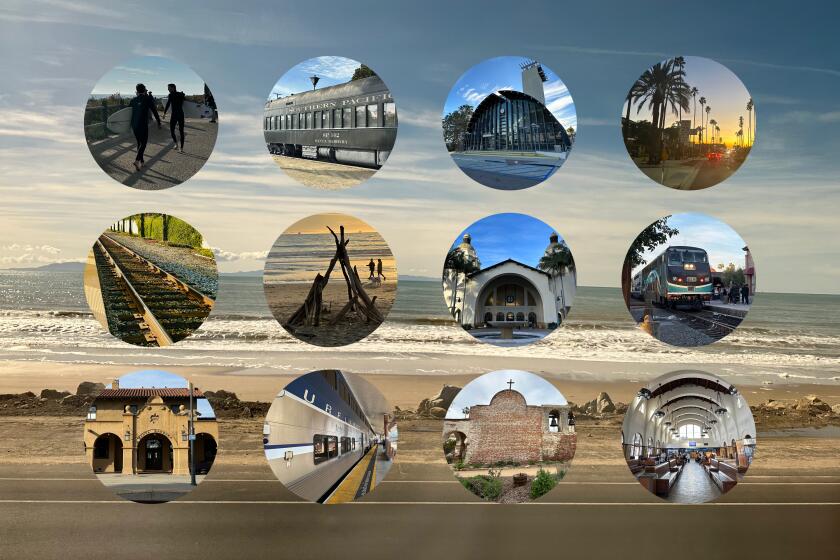With a Click or a Call, the Scoop Is All Yours
With all the attention focused on the first anniversary of the Sept. 11 attacks, it’s easy to forget that travelers rarely encounter terrorism.
“It is more likely you’re going to drop your wallet or get the flu than encounter a terrorist situation,” says Andrea Bestrul, spokeswoman for International SOS Assistance Inc., which has offices around the world that provide emergency medical assistance and safety information to more than 6,200 member companies.
“In reality, your biggest fear is crime,” including credit card fraud and rental car theft, says Ed Lee, managing director of the Lee Group in Nokesville, Va., an international security consulting firm. “You’re much more likely to encounter these [problems] than run into Osama bin Laden in the washroom.”
Bad weather, labor strikes and scams that target tourists are other common problems that can disrupt or ruin trips.
Realizing these risks, international corporations and agencies like the World Bank pay thousands of dollars to services such as Bestrul’s and Lee’s to keep abreast of changes.
Until recently, it was difficult for vacationers of modest means to gather this intelligence. But spurred partly by the post-Sept. 11 demands of newly security-conscious travelers, companies have begun selling affordable updates to vacationers.
One of the most sophisticated services is Worldcue Traveler, sold by iJet Travel Intelligence, (410) 573-3860, www.ijet.com, of Annapolis, Md., founded three years ago by former employees and contractors of U.S. government intelligence services.
For $25 per trip up to a month long, you get reports on your destinations, plus around-the-clock e-mail alerts on travel conditions. The service also offers advice on where to find emergency medical assistance and other aid but does not cover the cost of care, says Ken Lesniak, iJet’s vice president of partnerships.
The country reports, up to 100 pages, are nearly encyclopedic, with sections on entry-exit rules; security issues, such as civil unrest, carjackings and tourist scams; health risks; and local customs.
You can download an individual country report for $8 from iJet’s Web site or from www.amazon.com. (Search for “iJet.”)
The travel alerts include State Department warnings, transit strikes, airline policy changes and weather updates. Lesniak boasts that iJet, which employs scores of analysts and translators who scan international media and other sources, can beat regular news outlets.
I recently noticed that it carried up-to-the-minute information on floods in France and Belgium; CNN’s Web site reported only on the French floods.
The company has another service, called WorldLink, that combines the Worldcue service with rental of a cell phone (good in 130 countries but not in Latin America or parts of Asia) for $7.95 per day, or $13.95 per day for a satellite phone, plus the cost of air time.
SOS Assistance Inc. recently began selling alerts, which it calls “traveler safety assistance,” as an option with its medical service. The safety program sends automatic alerts by e-mail; they also can be faxed, spokeswoman Bestrul says. The alerts focus on health, safety and crime issues.
The medical-and-alerts package starts at $70 for trips up to 10 days. (800) 523-8662, www.internationalsos.com.
If you don’t want to pay for an intelligence service, you can collect much of the same information for free on the Internet, but this can be time-consuming because it’s scattered. A good travel agent can be a one-stop source; many subscribe to iJet or other services and also get reports from travel suppliers.
Here are some free sources:
* U.S. State Department: Its country reports and travel warnings are not updated frequently enough to satisfy some travelers, and it tends to focus on political violence at the expense of other dangers. But for the average U.S. tourist, the State Department remains the best all-around source on risks abroad, security experts say.
Its Consular Information Sheets are concise and well organized, its travel warnings are valuable (if sometimes tinged with diplomatic bias, critics say) and its 13-page publication “A Safe Trip Abroad,” which you can read on its Web site (under “Travel Publications”), is a cornucopia of sensible advice. (888) 407-4747 (live operators 5 a.m. to 5 p.m. Pacific time, weekdays), www.travel.state.gov.
* British Foreign and Commonwealth Office and Canadian Department of Foreign Affairs: Like the U.S. State Department, these offices issue country reports for their citizens but with some differences. They appear to contain more weather updates, for instance. For Britain, visit www.fco.gov.uk. (Click on “Travel” under “Services.”) For Canada, it’s www.dfait-maeci.gc.ca. (Click on “Travel Assistance.”)
* Centers for Disease Control and Prevention: This U.S. agency offers updates on disease outbreaks, health risks in various world regions, sanitation ratings for cruise ships and more. (877) 394-8747 (recorded menu), www.cdc.gov/travel.
* CNN: A quick way to catch up with critical news at your destination is to enter its name and search on CNN’s Web site, www.cnn.com.
* Internet bulletin boards: Many travel Web sites have sections where travelers can share destination information.
Run by publishers of the Lonely Planet guides, the Thorn Tree, at www.lonelyplanet.com, reported more than 100,000 registered users last month. It arranges comments by destination, but finding specifics on risks can be tedious.
For Europe, I like the “Tourist Scam Alert” on the “Graffiti Wall” at www.ricksteves.com, run by Rick Steves’ Europe Through the Back Door tour company. It’s full of firsthand accounts of getting shortchanged at a cash register in Italy, deceived by a “defective” ATM in France, robbed by a pickpocket in Barcelona and more.
“After reading several months of these postings, I don’t think I would ever want to leave home,” Frank P. commented in one e-mail.
But having made many crime-and crisis-free trips to Europe, he has concluded, “Apply a little care and caution, and you should be fine.”
And in most cases, security experts say, you will be.
Jane Engle welcomes comments and suggestions but cannot respond individually to letters and calls. Write Travel Insider, Los Angeles Times, 202 W. 1st St., Los Angeles, CA 90012, or e-mail jane.engle@latimes.com.
Sign up for The Wild
We’ll help you find the best places to hike, bike and run, as well as the perfect silent spots for meditation and yoga.
You may occasionally receive promotional content from the Los Angeles Times.



